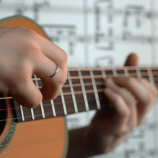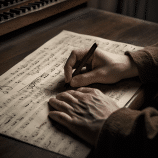Everyone wants to have more time and make every day count. By optimizing your workflow you can maximize your productivity and efficiency and more done. Here are my tips:
1. Workspace
Having a clean and quiet workspace is the first step to being able to work effectively. Have your gear setup and ready to go so you don’t have to hassle about when you’re ready to work.
2. Templates
Do you use templates? You should be, it can saves valuable minutes you could be using to write that killer theme. Having a basic orchestra template ready to load will save time setting up instruments. I personally have templates for small and large ensembles with my favorite synths ready to go.
3. Save your presets
If you like to tinker and create your own sounds, chances are at some point you’ve either lost them or could never replicate them again. It’s always a good idea to save your presets!
4. Keep Notes
Do you keep a compositional notebook? It can be a great way to keep you from forgetting ideas that otherwise would help you on a later track. Inspiration can hit you anywhere, make sure you’re prepared and you have your notebook with you.
5. Disconnect
If you’re like me, when you’re on the computer you’ll have your emails, Twitter, Facebook and various other social media sites open. It’s great to be connected but they’re also a distraction. When sitting down for a serious session, turn them off. You won’t miss anything, promise.
6. Use Shortcuts
You may only save a couple of seconds, but they add up quickly. Learning the shortcuts for tasks you do regularly will save you time in the long-term. Once you’re use to using shortcuts you’ll find it helps you keep a fast pace and to keep your train of thought.
7. Record ideas
When you’re improvising at the piano or just toying with an idea on your instrument of choice it’s far too easy to let them little gems be forgotten. Have a recording device to hand and keep a record of your ideas, you never know when they’ll come in handy.
8. Use loops for mock-ups
Using loops to produce mock-ups is a great way to lay the foundation on a track or cue quickly. So let’s say you’re writing an upbeat, positive track for TV. Grab a simple drum loop from a library, a baseline or even some effects. This gives you a canvas to get your other elements together. Later you can replace the temp tracks with your own.
9. Keep a good filing system
Keeping a good filing system, especially when it comes to your hard drives is essential for composers to work quickly and effectively without losing the spark when you’ve hit a great idea. This means having your sample libraries nicely organized and VSTs, Audio Units setup and ready to go with a mouse click.
10. Get a second opinion
Fresh ears can always pick up on something you’ve overlooked. Someone you can turn to for help and criticism is invaluable. If you don’t have anyone to hand, upload your work to our community forum and get feedback.
These are just a few things I’ve used in the last year as I’ve started to refine my composition sessions and so far it’s paid off. Can you share any tips? How do you stay productive?





